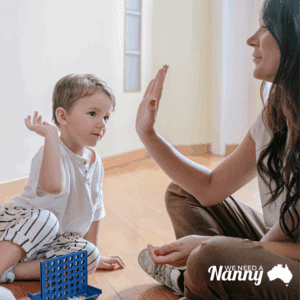Whether you naturally rise with the sun every morning or stumble out of bed only to hear the sound of your alarm, feeling less than refreshed, the notion of a serene morning with kids may feel like a dream. Your mornings may be filled with chaos and a whirlwind of activity, especially where there are children involved. However, you can easily turn this chaos into serenity by following the golden rule to a successful start – establishing a consistent morning routine.
Establishing a consistent stress-free morning routine for your kids and your family is the key to a successful and calm start to the day. Even though routines may seem too predictable and monotonous, they are invaluable when you need to reduce stress and enhance the flow of your day. How effective your routine will be naturally lies in the ability of such a routine to provide a structure for your children and family during the mornings. Kids, despite their knack for testing limits, thrive on routine and find comfort in knowing what to expect, which makes calm behaviour so much easier to encourage.
You may find that younger children tend to rise earlier for school than teenagers who prefer to sleep in. However, children of all ages can learn to adapt to a healthy sleep routine and morning routine with patience and practice.
Thus, by starting small and following the step-by-step guide, manageable tasks will pave the way forward towards a smoother morning experience to set the overall tone of the day.
Why Morning Routines Are Important
Morning routines are essential to help children develop a sense of structure and predictability in their day, which in turn leads to better child development. Having a consistent morning routine helps to improve time management and creates a sense of responsibility for younger kids. It helps them feel more secure and prepared for the day ahead and helps them develop good habits, with an overall positive attitude towards the day that lies ahead. A solid morning routine also helps to reduce stress and chaos in the mornings.
Creating a Realistic Morning Routine
The first step to a good morning routine is to identify all the tasks and elements that encompass your morning and to establish areas where you are lacking. For example, look at tasks such as getting dressed, having breakfast and tidying up. Consider the ages of your children and what they can master themselves.
Setting up a morning checklist for children and your family helps everyone stay on track and divides responsibilities. You can also involve your older children in creating a morning routine to encourage their ownership and help them contribute. Keep in mind the routine must be flexible, as mornings do not always go as planned.
Preparing for the Morning
Setting a positive example for kids during school mornings is crucial since children tend to mirror our behaviours. It is essential to keep a calm and composed demeanour even if mornings seem chaotic because it significantly influences the children’s daily routines.
When parents project tranquillity, children will embody the same peace and calmness. Being stressed and overwhelmed, on the other hand, will manifest in your kid’s behaviour, usually through defiance and procrastination. Understandably, managing life’s chaos is overwhelming, especially with an endless to-do list, however it is essential to start the day at a relaxed pace.
Here are some tips to prepare for mornings:
- Try to prepare as much the night before to make mornings easier and less chaotic.
- Lay out clothes, pack backpacks, and organise lunches the night before.
- Create a checklist for older children with small tasks that they can perform in the mornings.
- Try to prepare for breakfast, or get ideas for healthy breakfast options the night before to make mornings less stressful.
- Set an alarm or reminder to help you and your family and the kids wake up on time.
- Make sure that you allocate ample time for coffee and getting ready in the mornings to prevent rushing, and have some room for flexibility.
Morning Routine Checklist
A morning checklist is an excellent method to streamline morning activities and teach children responsibilities. You can use incentives or positive reinforcement to encourage kids to complete their tasks on the morning checklist. Make sure that the checklist is clear and visible, as well as easily accessible for children so that they can take ownership of their morning routines.
A few tasks that you could include are:
- Getting Dressed.
- Washing up and brushing their hair and teeth.
- Making their bed.
- Folding up their pyjamas and packing them away.
- Finishing their breakfast.
- Packing their lunch in their backpacks.
- Putting on a jacket or cap if needed before they leave.
Tips to Implement Morning Routines for Kids
You must create a morning routine that is tailored to the specific needs and ages of your kids. For younger children, it is more viable to focus on smaller tasks such as getting dressed and having breakfast. Whereas older kids can take on more complex tasks, such as completing homework and packing backpacks. Also, make sure that you include some time for play and relaxation with each child in your morning routine to avoid stress and chaos.
Wake Up Before Your Kids
Try to rise at least 30 minutes earlier than the rest of the household to carve out some time for yourself. If you struggle to sleep, try to adjust your bedtime to align with that of your kids. You need some quiet time to gather your thoughts, and maybe a moment in the back room or bathroom before you start your day. This time is essential for your self-care, to ensure that you remain calm and collected throughout the hustle and bustle of mornings.
Make Tasks Simple
Morning tasks are easily simplified by handling as much of the preparation the night before and with effective planning.
Here are a few tips and steps you can take to simplify morning tasks:
- Encourage your children to select their outfits for the next day, the night before.
- Instil a habit of packing completed homework and backpacks the night before.
- Include your children in grocery shopping so that they can help you decide what to buy for their lunches and breakfasts for the week.
- Opt for simple, yet nutritious breakfasts like porridge and cereal.
- Keep in mind simplifying routines takes patience and practice, and occasional hiccups will occur but eventually become much less stressful.
Prepare for Challenges
While it’s essential to maintain a consistent routine, flexibility is just as important due to life’s unpredictability. Unexpected events, such as a late-night emergency, holidays, and illnesses can disrupt your schedules and make it challenging to stick to routines or wake-up times.
It is important to acknowledge these challenges and accept that you will have setbacks from time to time. Often children may also struggle to adhere to routine and test boundaries, so instead of nagging or punishing them, create an opportunity for them to learn from their mistakes.
Always have a Healthy Breakfast
Children need a filling healthy breakfast to ensure that they have enough energy to concentrate and complete tasks at school. Thus, it is important to provide a healthy breakfast to help children feel energised and focused throughout the morning.
- Offer some variety, such as porridge, fruit, yoghurt, or wholegrain toast.
- Prepare breakfast the night before, or at least plan breakfast options.
- Involve young kids in the process of preparing breakfast and choosing what they want to eat to encourage them to try new foods.
Practice Makes Perfect
You can quickly change mornings into a more manageable experience with practice. No routine will work out perfectly from the start. You require time and many changes to refine the routine. Each task must be tried and tested with adjustments made along the way.
Routines are always evolving. The key is to fully prepare your children for what is expected of them, to set the stage for smooth mornings. So before you present your kids with a lengthy to-do list of expectations, take some time to teach them the morning routine, and adjust the routine according to their capabilities.
Use the When and Then Method
As a parent, you know that simply asking a child to complete a task does not always guarantee their compliance. Though you may encourage their cooperation, their resistance could easily hinder any progress. So this is where the When/Then routine comes into play in establishing new morning routines. For example, if your child is reluctant to brush their teeth, tell them when they have brushed their teeth, then they may leave for the playground.
It is offering something either from the checklist or a small incentive to encourage the child to complete a task first. Keep in mind that kids’ priorities are not similar to those of adults. They often get sidetracked and prioritise play before actual essential tasks. Thus, it may take some time to encourage them to complete a task.
Always Set a Positive Tone
Lastly, it is essential to start the day with a positive tone, using positive reinforcement and plenty of encouragement. Try to use affirmations and positive self-talk to help your kids feel confident and motivated. Making eye contact and using physical touch, such as giving hugs or high-fives, shows kids love and support, especially during the mornings. You could even play uplifting music or nature sounds to create a more positive and calming atmosphere in the mornings.
How to Maintain the Routine
Once you have established an effective morning routine, it is essential to stick to the routine as much as possible, even with weekends and days off.
- Be consistent and predictable with your morning routines. It ensures that kids feel safe and secure.
- Once kids feel more confident with their morning routine during the school year, they will start developing good habits.
- Try to make adjustments to your routine as soon as possible, but always maintain a sense of structure and predictability.
- Use positive reinforcement or incentives to encourage kids to follow their routines.
Overcoming Morning Challenges
It is vital to identify morning challenges, such as waking up early or getting dressed. Making a few small adjustments to the routine as needed could help kids feel more comfortable and confident in the mornings. When kids show resistance, use positive reinforcement and plenty of patient encouragement to help them overcome these challenges. Offering rewards and incentives for completing morning tasks and following the routine is also an effective method to encourage kids.
Making Mornings Enjoyable
Besides basic morning routines, it is also important to make mornings enjoyable for kids. Try to incorporate a few fun activities and games for them, or use music and dance to create a positive atmosphere. Use fun activities or rewards as positive reinforcement and encouragement to help kids feel happy and motivated. Mornings also offer a special time for bonding and connection with your kids.
Get Enough Rest
Just as important as morning routines are, establishing a strong bedtime routine is an essential part of a successful morning routine. Positive parenting is having a strong nightly routine and ensuring families get sufficient sleep to prevent morning chaos and fatigue. Getting a good night’s rest is vital for children and adults to lay a foundation for an effective morning routine.
Conclusion
Regardless of the amount of children you have, or how chaotic your home is, establishing a good morning routine is key to success. But be prepared. It takes time, patience and flexibility to get into a good routine.
Key Takeaways for a Smooth Morning
- Make sure you have a good night’s routine and get enough sleep. It is the cornerstone of a successful morning.
- Use a schedule or routine checklist to help your kids stay on track.
- Delegate morning duties and tasks.
- Prepare as much as you can the night before to save some time in the morning.
- Make sure to include some time in the mornings for relaxation, self-care, play and bonding with your children.





